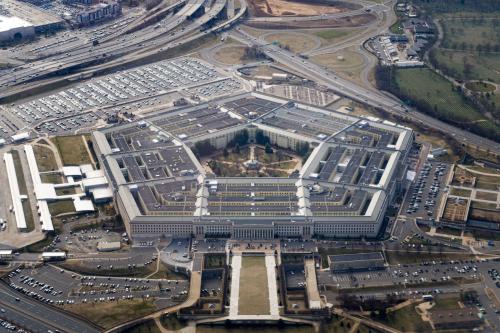
Editor’s Note: The blog posts in this series are adapted versions of speakers’ opening remarks from the June 24th Brookings Debate, which asked: “Should the U.S. put boots on the ground to fight ISIS?”
We need to do more than what we are doing right now to combat Islamic State (or ISIS). This is particularly true in Iraq and Syria—but for the purposes of my opening comments, I will focus on Iraq, since the two countries are two quite different fronts, albeit both part of a common overall campaign. ISIS now also poses a threat in parts of Yemen, Libya, and elsewhere. We need different strategies for each of those contexts based on traditions in different countries.
In Iraq, we need roughly two to three times as many U.S. troops as we have now. Instead of 3,000 to 3,500, or the 4,000 that President Obama seems headed toward, I’m in favor of something in the range of 7,000 to 10,000. Moreover, instead of simply advising and training at the central locations like we are today, we’re going to have to get down to the brigade level. In the overwhelming majority of cases, this would not mean fighting for the Iraqis; rather, U.S. forces would be on the ground advising. Counter-insurgency is tough, and Iraqi forces are not quite ready for that fight.
Senator Murphy has argued that somehow we failed to train the Iraqi military after 10 years. In technical terms, that military wound up a lot better—the problem is that the politics fell apart after we left. Then-Prime Minister Nouri al-Maliki turned out to be a bad guy, and it was the Bush administration that thought that he was the right guy. They were wrong. He tore the country apart, and the Obama administration was correct to convince the Iraqis to get rid of Maliki. And we’d be wrong to sit and hope that someone better than current Prime Minister Haider al-Abadi is out there. That’s why the United States needs to get more directly involved.
Blitzkrieg-style, not incrementalism
To really get progress and momentum going in Iraq—a prerequisite, at this stage, to progress in Syria—I think we need roughly two to three times the number of people we have now. They’ll need to be deployed in more forward locations and operating in conjunction with air power, which we’re already using.
U.S. troops may be particularly important in certain fights in the cities. In fact, I believe we should actually preposition American special operations for direct action against ISIS at a moment of our and the Iraqis’ choosing, once we are ready for a major counteroffensive. Such an offensive would be more likely to occur next year, not this year. I would like to see joint special operations command help in some very hard hitting and blitzkrieg-style special operations in which we actually seize the initiative, rather than get bogged down in incrementalism. I am in favor of having 2,000 to 3,000 American special operations forces involved in several weeks’ worth of raids, in conjunction with the Iraqis, once the moment is right—but the moment isn’t right now.
Focus on inclusivity
Finally, politics come first in Iraq. To take this to the next level, we need to push the Iraqis to create a national guard that allows Sunni tribesman, some members of some Shiite militias, and other Iraqis who presently do not want to join the Iraqi army or police to have some role in this fight. Right now, we are unable to attract enough recruits to the Iraqi Security Forces, jeopardizing what started off last year as a good strategy that has petered out. If anything, ISIS now has the upper hand again, slightly, in Iraq.
The U.S. plan to combat ISIS should include doubling or tripling our forces, having advisers more forward, and being willing to do some special operations raids over a short period when the time is right. Moreover, we must really push the Iraqis to take the national guard concept to the next level so they can bring Sunni tribesman and other Shiites into a joint force that will fight and defend their homeland—not some general notion of an integrated Iraq that is not really there to be defended right now.
The Brookings Institution is committed to quality, independence, and impact.
We are supported by a diverse array of funders. In line with our values and policies, each Brookings publication represents the sole views of its author(s).




Commentary
U.S. boots on the ground against ISIS: Necessary, in conjunction with an improved Iraqi force
July 6, 2015